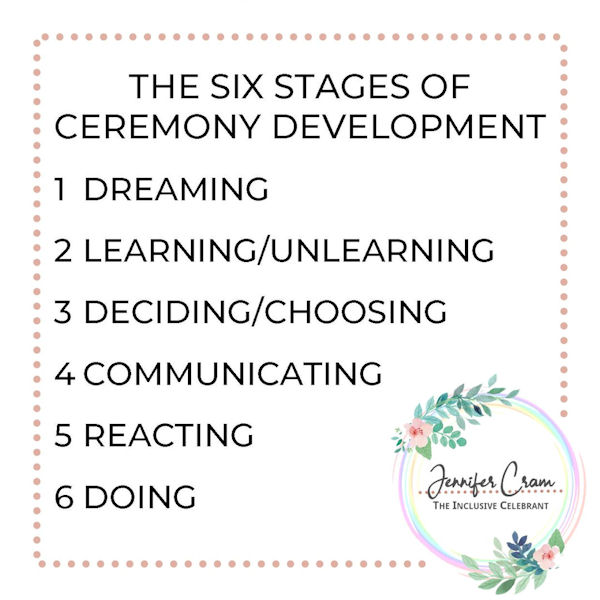The Six Stages of
Ceremony Development
Categories: | Wedding Ceremony |
 When you decide to get
married, you are signing up for a legal change
of status. A change of status that happens by
means of a ceremony. When you decide to renew
your vows, or have a naming ceremony for your
baby, you are signing up for a ceremony.
Regardless of whether it is a legal ceremony or
not, how it is developed makes a huge difference
to your experience throughout, and to the
experience of your guests on the day.
When you decide to get
married, you are signing up for a legal change
of status. A change of status that happens by
means of a ceremony. When you decide to renew
your vows, or have a naming ceremony for your
baby, you are signing up for a ceremony.
Regardless of whether it is a legal ceremony or
not, how it is developed makes a huge difference
to your experience throughout, and to the
experience of your guests on the day.
Get married in the Registry Office, and you will experience a one size fits all process. With a celebrant you may be offered a choice of a handful of pre-written ceremonies that you can tweak, or what I call a mix-and-match ceremony, where you are given a resource file, a collection of introductions, readings, vows, and concluding words from which to choose and a pre-determined structure to slot your choice into.
Let's put all of those to one side, and talk about how I personally work, regardless of whether you wish to have a very simple ceremony or a full-on personal (rather than personalised - the difference is important) one. A bespoke ceremony.This is where my six stages of ceremony development kick in.
1. Dreaming
So what do I mean when I say stage 1 is Dreaming? Simply that, when you get engaged you start thinking about when, where, and how you want to get married. You start to form a vision (together) of what that day will feel like, and perhaps how it will look..
If you are planning another type of ceremony, the same thing applies. Based on previous experience, or what you understand the ceremony to be and to require, you start to form a vision, but also, as with a wedding ceremony, you may feel that you are required to operate within certain constraints.
2. Learning and
Unlearning
But it is also at this stage where things can, and very definitely should, get interesting. Learning what you have to do to be legally married is easy. Unlearning all the things that the movies, television, magazines, and other people have "taught" you about what a wedding is, is by no means easy because there is a lot of push back, a lot of misinformation, a lot of outdated beliefs and very strong memories. This is why most weddings are pretty predictable. And, unfortunately, people who work in the wedding industry are no less susceptible than are first time marrying couples.
At Stage 2 I spend a lot of time and effort unpacking wedding beliefs. My aim being that you will come to the process of making decisions about your wedding ceremony and choosing what to include and what to discard with confidence. And, especially, sidestep the gender role stereotypes that are still distressingly common.
And ditto for other ceremonies. Peer pressure from dead people, particularly Queen Victoria, plus particular ceremony approaches and formats common in the movies/on TV, tend to form the ideas we have about ceremonies. I say we, because celebrants aren't immune. I've spent 15 years forensically dissecting those ideas, challenging my own thinking, and writing about how weddings can be!
3. Making decisions
and choices about how your ceremony will be
4. Communicating
5. Reacting
6. Doing
